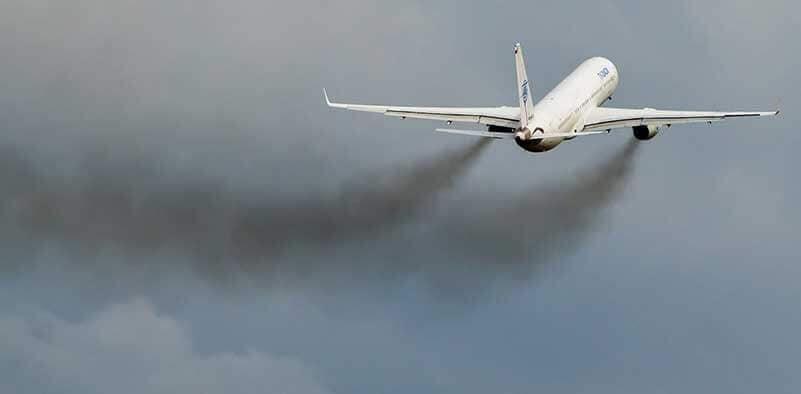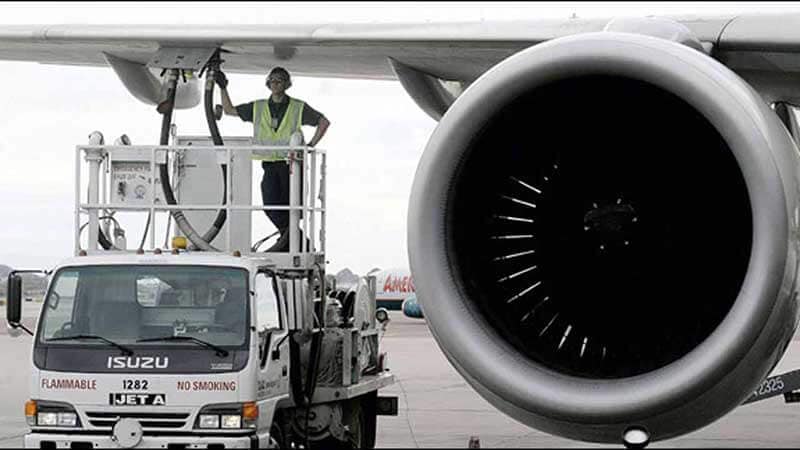- The aviation industry is one of the fastest-growing sources of greenhouse gas emissions
- A commercial flight partly fuelled by recycled waste recently flew across the Atlantic
- The new technology could potentially satisfy 20 per cent of the global aviation industry’s fuel demand
You’ve probably heard the grim predictions by now: we only have about 12 years left to reduce our impact on the environment and limit global warming to a maximum of 1.5 degrees Celsius. If we don’t, the consequences will be severe, including increased risk of extreme heat, drought, forest fires, floods, hurricanes, and food scarcity. To achieve the 1.5°C goal, we need to find a way to reduce carbon pollution by 45 per cent by 2030 and eliminate it completely by 2050. The good news is that it’s doable, but it’s going to require a concerted effort across industries. And we need to act fast. As one of the world’s major offenders in terms of greenhouse gas emissions, the aviation industry could play a significant part in helping us reach this goal.
The aviation industry is one of the fastest-growing sources of greenhouse gas emissions
The European Union estimates that the aviation industry is responsible for more than 2 per cent of global greenhouse gas emissions. That may not sound like much, but you also need to take into account that, due to the growing popularity of air travel, the amount of greenhouse gas emissions from aviation has increased by nearly 90 per cent in the period between 1990 and 2006. If this trend continues, the International Civil Aviation Organization (ICAO) predicts that global aviation emissions could increase with 70 per cent by 2020 and another 300-700 per cent by 2050.

To prevent this from happening, the ICAO adopted a historic resolution known as the Carbon Offsetting and Reduction Scheme for International Aviation (CORSIA), which called for airlines to implement a series of measures designed to reduce the industry’s carbon footprint. These include introducing new, more fuel-efficient aircraft, adopting new technology that will enable them to set more efficient flight paths and reduce delays, and switching to alternative, more sustainable fuels. A number of alternative fuels have been developed in recent years, but this latest example may be the most promising yet.
A commercial flight partly fuelled by recycled waste recently flew across the Atlantic
On 4th October 2018, a Virgin Atlantic flight from Orlando to London successfully crossed the Atlantic and landed at Gatwick Airport. What made this flight special was that the Boeing 747 that executed it was partly fuelled by recycled waste. The new fuel was developed by the US-based biotech firm LanzaTech, in collaboration with the Pacific Northwest National Lab and the US Department of Energy. It’s an innovative process that captures carbon-rich waste gases produced by heavy industrial processes like steelmaking and turns them into ethanol, which is then used to produce various products, including jet fuel.
https://www.youtube.com/watch?v=Wl2lStkm4mA
“Long haul travel is more important than ever for connecting people around the world and it’s our responsibility to ensure we’re doing that in the most sustainable way possible. Working with LanzaTech will enable us to greatly reduce our carbon emissions and at the same time, help support UK industry,” says Sir Richard Branson, the founder of the Virgin Group. “The LanzaTech process is important because this fuel takes waste, carbon-rich gases from industrial factories and gives them a second life – so that new fossil fuels don’t have to be taken out of the ground. This flight is a huge step forward in making this new technology a mainstream reality.”
The new technology could potentially satisfy 20 per cent of the global aviation industry’s fuel demand
LanzaTech already has one operational alcohol-to-jet (ATJ) facility in China, but it’s now looking for the UK government’s support to build similar facilities in the UK as well. According to the company, with three of these facilities, they would be able to produce up to 473 million litres of sustainable jet fuel per year. That would be enough to fuel all of Virgin Atlantic’s outbound flights from the UK and prevent the release of nearly one million tonnes of CO2 annually. Furthermore, if the technology were to be scaled up to encompass every eligible steel mill in the world, it could produce enough fuel to satisfy approximately 20 per cent of the global aviation industry’s fuel demand. And the technology wouldn’t even have to be limited to steel mills, as it could be adapted to process other waste sources, such as gases from oil refineries or residue from agricultural processes. The new fuel also boasts 70 per cent lifecycle carbon savings and doesn’t compete with other industries for land, food, or water. Best of all, since it comes from widely available waste streams, its price could be comparable to fossil fuels.

Earlier this year, the fuel was thoroughly tested and reviewed by aircraft manufacturers and other specialists and ultimately approved for use in up to a 50:50 mix with fossil jet fuel by the ASTM International committee. The tests showed that the fuel’s performance is on par with or even superior to traditional jet fuel on a variety of metrics. “We have shown that recycling waste carbon emissions into jet fuel is not impossible, that waste carbon needs to be thought of as an opportunity not a liability, that carbon can be reused over and over again. Together we can create the carbon future we need,” says Jennifer Holmgren, the CEO at LanzaTech.
The aviation industry already has a massive carbon footprint and it’s set to increase even further over the coming years as air travel becomes more and more popular. Replacing old aircraft with new, more fuel-efficient models does help, but it’s not enough to reduce the industry’s environmental impact on its own. The industry will also have to switch to alternative, more sustainable fuels. Thankfully, we already have the technology to make this possible. Companies such as LanzaTech are developing new, sustainable types of fuel with a performance and price point comparable to that of traditional fossil fuels. It may not be long before we’re all flying in airplanes powered by recycled waste.
Share via:


